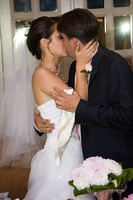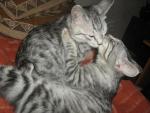Пена

Recently I came across some really pretty pictures of sea waves that inspired me. In those pictures I could see the white foam tongues slowly go up and down the shore. I could almost feel a light breeze go through my hair. In Russian that white foam is called «пена» and just like in English this word has multiple meanings.
For example, “shaving foam” is «пена для бритья» and “bath foam” is «пена для ванн».
| После использования пены для бритья «Жилет», моя кожа очень приятная на ощупь. | After using Gillette shaving foam, my skin is very nice to touch. |
| После долгого дня я люблю расслабиться в ванне с пеной для ванн с запахом лаванды. | After a long day I love to relax in a bathtub with lavender bath foam in it. |
Interestingly enough, the verb «пениться» in Russian slang is formed from the same root but means to get "angry”, “annoyed” or "worried".
| Что он пенится? Наш рейс только через три часа. И так слишком рано приедем! | What is he so annoyed about? Our flight is not for another three hours. We are going to be too early anyway! |
| Не пенься ты, успокойся! Всё будет нормально! | Don't you worry, come down! Everything will be fine! |
However, when we talk about foam in cappuccino, or any other hot drink we call it «пенка», “little foam”. Speaking of which, I think the most disgusting thing you can try is молоко с пенкой, “milk with foam”. That’s that little skin that forms on milk when you boil it. It’s so gross, I’m shuddering even now as I type. ![]() I remember when I was at kindergarten, they would make us drink it… one of the most horrifying experiences of my childhood!
I remember when I was at kindergarten, they would make us drink it… one of the most horrifying experiences of my childhood! ![]() Luckily, my mom soon came to my rescue and protected me from the evil пенка, “foam”! Thanks, Mommy!
Luckily, my mom soon came to my rescue and protected me from the evil пенка, “foam”! Thanks, Mommy! ![]()
Сюда
The Russian word for “here” in the sense of motion “to here” is сюда. For instance, if your little brother still has trouble tying his shoelaces, you might say:
| Иди сюда, я тебе зашнурую туфли. | Come here, and I'll tie your shoes for you. |
The word combines fairly naturally with words that indicate bringing things or people somewhere:
| Принеси сюда, пожалуйста, словарь. | Bring the dictionary here, please. |
| Я люблю этот парк. Я сюда всегда привожу племянника. | I love this park. I always bring my nephew here. |
It can also combine with verbs of arrival, but just as in English it can be left out of those sentences as well:
| Она (сюда) пришла в семь вечера. | She arrived (here) at seven in the evening. |
| Они (сюда) прилетели уже вчера. | They arrived (here) yesterday. |
When you make a phone call to a location, that's conceived as a motion phrase in Russian, thus in «Я позвонил ей на работу» “I called her at work” the noun работу is in the accusative case, which makes it a motion phrase; thus the prepositional phrase can be replaced by сюда in sentences about phoning:
| Люба, не звони мне сюда. Ты же знаешь, что директор не любит личных разговоров в рабочее время. | Lyubov, don't call me here. You know that the boss doesn't like personal calls during working hours. |
Горько
 Last weekend I was invited to my friend’s wedding. It was a great celebration with lots of dancing, delicious Russian food and… wait for it… drinking!
Last weekend I was invited to my friend’s wedding. It was a great celebration with lots of dancing, delicious Russian food and… wait for it… drinking! ![]() Being there made me think of a great word to write about — «горько». No Russian wedding can go without people yelling «горько» to the bride and groom. Literally translated, this word means "bitter”. According to the tradition, people say it at the end of their toasts or just surprise the newlyweds with it at any moment during the wedding to make them kiss. The idea behind this tradition is that the guests want to see the bride and groom kiss. By yelling «горько», people let them know that they can’t stand the “bitterness” in the air and ask them to make it sweeter by kissing each other.
Being there made me think of a great word to write about — «горько». No Russian wedding can go without people yelling «горько» to the bride and groom. Literally translated, this word means "bitter”. According to the tradition, people say it at the end of their toasts or just surprise the newlyweds with it at any moment during the wedding to make them kiss. The idea behind this tradition is that the guests want to see the bride and groom kiss. By yelling «горько», people let them know that they can’t stand the “bitterness” in the air and ask them to make it sweeter by kissing each other.
| Я хочу вам пожелать долгой и счастливой совместной жизни! Горько! | I would like to wish you a long life of happiness together! Give us some sugar! |
| Когда гости закричали «горько», жених поцеловал невесту. | When the guests yelled “bitter,” the groom kissed the bride. |
| — У меня выскочила лихорадка! — Что же ты будешь делать, когда «горько» кричать будут? — Ну, знаешь же, как говорят, что у мужа с женой всё должно быть общее… вот мы и это разделим! |
“I got a cold sore!” “What are you going to do when they yell “kiss”?” "Well, you know how they say, “what’s mine is yours now”… so we’ll share that too!" |
 Sometimes the guests play it trickier and instead of just yelling «горько», they start saying that the wine is bitter or the food is bitter; thus, indirectly asking the newlyweds to sugar it up. Once they made them kiss, everybody begins counting very slowly to see how long the kiss will last. It is generally considered that the more the guests yell, «горько», the happier the couple’s life will be. Therefore, when you are at a Russian wedding, don’t hesitate to use it!
Sometimes the guests play it trickier and instead of just yelling «горько», they start saying that the wine is bitter or the food is bitter; thus, indirectly asking the newlyweds to sugar it up. Once they made them kiss, everybody begins counting very slowly to see how long the kiss will last. It is generally considered that the more the guests yell, «горько», the happier the couple’s life will be. Therefore, when you are at a Russian wedding, don’t hesitate to use it! ![]()
Здесь, тут
Russian has two words for “here” in the sense of location “at here”: тут and здесь. They mean exactly the same thing; the only difference is that тут has a more conversational tone, so if you are writing a formal essay, stick to здесь. Sample sentences:
| Ты тут живёшь? Ты здесь живёшь? |
Do you live here? |
| Где тут аптека? Где здесь аптека? |
Where is there a pharmacy around here? |
| Вот тут я первый раз поцеловала Бориса, и хотя с тех пор прошло уже двадцать лет, ощущение его губ на моих никогда не покинуло меня. | Here is where I kissed Boris for the first time, and although twenty ears have passed since then, the memory of his lips on mine has never left me. |
| Видишь вот этот ресторан? Я здесь первый раз ел щи. | Do you see this restaurant? I ate cabbage soup for the first time here. |
One mistake English speakers make in Russian is to use these words when trying to say “Come here,” and they produce something like «Приходи здесь». The sentence is completely awful in Russian. The first problem is that здесь/тут can only be used to mean location “at” a place, not motion “to” a place. The second problem is that if you are talking to someone in person, then they have already arrived, so приходить/прийти “to arrive/come” just doesn't make sense. The right way to say it is «Иди сюда». We'll discuss сюда in the next few days.
Лапа
The Russian word for paw is лапа. It is a perfectly regular second declension noun:
| Sg | Pl | |
| Nom | лапа | лапы |
| Acc | лапу | |
| Gen | лапы | лап |
| Pre | лапе | лапах |
| Dat | лапе | лапам |
| Ins | лапой | лапами |
Just as in English, we can use this word when talking to a dog to make him perform tricks:
| Дай лапу! | Shake a paw! |
Unlike English, Russian can produce a bundle of diminutive forms to say the same thing:
| Дай лапку! Дай лапочку! Дай лапушку! |
Shake a paw! |
Sometimes the word is also used as a derogatory word for human hands as well. For instance, if man makes an unwanted advance, a woman might say:
| Убери лапы, идиот! Я не из таких. | Get your paws off me, you idiot! I'm not that kind of girl. |
But the place where this word gets a lot of mileage is in the diminutive лапушка, which is roughly the equivalent of “a sweetie” or “a cutie” in American English. For instance, if your neighbor shows you a boxful of newborn kittens, you might say:
| Ой, какие лапушки! Можно подержать? | Oh, what little cuties! Can I hold one? |
Tanya, who occasionally writes for this blog, has a little dog named Wiggles. Sometimes she will say to him:
| Виглз, лапушка ты моя, иди, садись к маме. | Wiggles, you little cutie pie, come over here and sit next to Mommy. |
And sometimes that form is even used with people:
| Ванечка, лапушка, как красиво ты сегодня выглядишь! | Johnny, my little sweetie, you look so handsome today! |
<< 1 ... 73 74 75 ...76 ...77 78 79 ...80 ...81 82 83 ... 158 >>





















